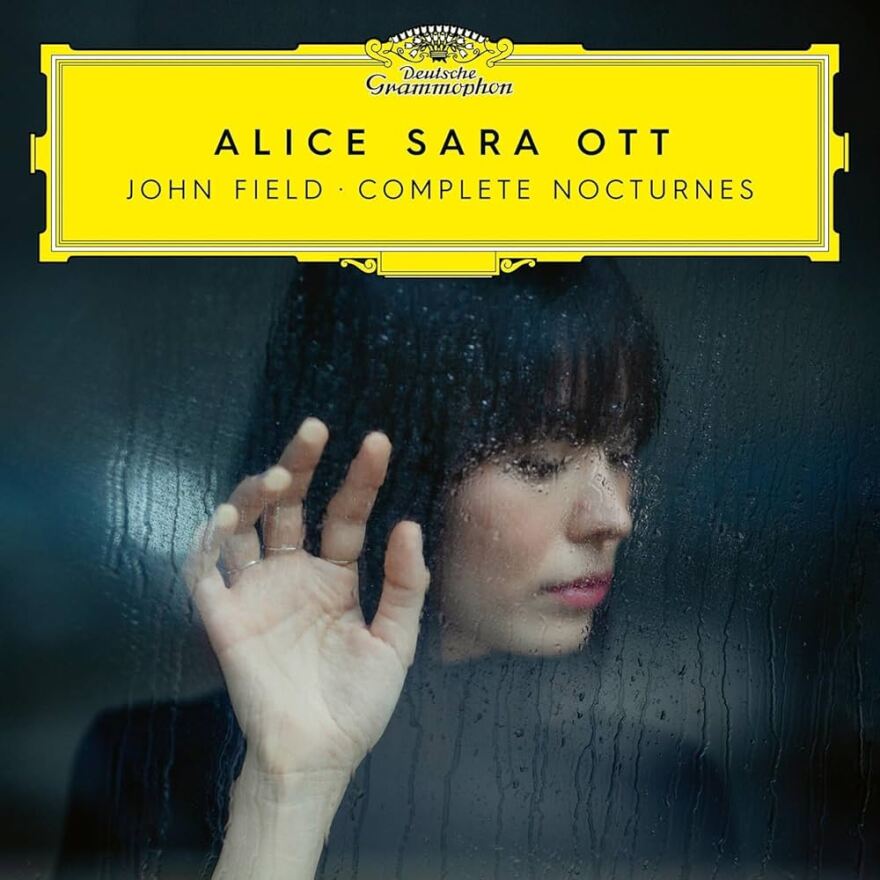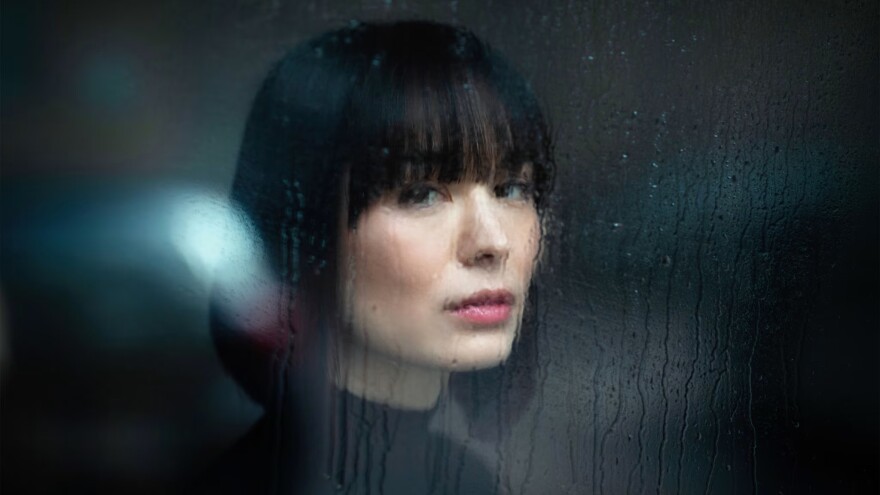Pianist Alice Sara Ott’s latest album features 18 hidden gems you might not have heard before — all of the "Nocturnes" by the Irish composer John Field (1782-1837).
A nocturne is a piece inspired by twilight and the nighttime hours. Frederic Chopin is likely the first composer classical fans might associate with the musical term "nocturne," but Field in fact invented the style with these 18 beautiful melodies. As Ott notes, Field's work is maybe a little deceptive.
"Sometimes when you start listening to one of the nocturnes, you're trapped into thinking, 'oh, this is very simple music,'" Ott said. "But [Field] always manages to surprise you, and the music takes unexpected turns."
"It's very profound music," she added.
Along with her album for Deutsche Grammophon, Ott has been releasing a series of music videos to accompany the nocturnes. Some of them are set in an imaginary cityscape, or in a frozen wasteland. The latest one, for Field's "Nocturne No. 1," has just been released (see below).
Alice Sara Ott said the videos are yet another way she can express the artistry of her music. She's very involved with the process.
"I'm always very interested in the different tools that are available to us, and finding ways to incorporate it so that the emotions that we want to share through the music can be enhanced or amplified," she said.
To read a transcription of our conversation with Alice Sara Ott, scroll down. The full interview audio is also available to listen to through the embedded audio player below.
Nathan Cone: I find your performance of the John Field "Nocturnes" to be probably my favorite of the two or three recordings that I know, and I think it's because you do such a great job of bringing out the early Romantic-era side of them as well. I was wondering if you could tell me a little bit about your interpretation of the Nocturnes of John Field.
Alice Sara Ott: It was a very refreshing process, because most of the time I play music where I have, like, millions of references. And this time, I really enjoyed the existing recordings, because that's how I discovered this music during the COVID-19 pandemic, when I wanted to put together a playlist with nocturnes, and then I came across the Nocturnes by John Field, which I didn't know at all. But at the same time it was a very beautiful discovery for me, and I really enjoyed the time when I studied these pieces, because these are all beautiful pieces, and he's an incredibly versatile composer. And somehow, sometimes, when you when you start listening to one of the nocturnes, you're trapped into thinking, “Oh, this is very simple music,” but he always manages to surprise you, and the music takes unexpected turns. Sometimes he puts a pause somewhere where you don't expect it at all. You're like, “What just happened?” Or the way how he ends the piece, it's so full of humor. And then he also touches this brief moment of sadness, of agony, of joy, without really kind of dragging you down. And he releases you with a kind of light heart, which is something I appreciate very much in this music. And still, it's very profound music. It was also challenging because you don't have these references [Ed. many recordings to compare], so it becomes very challenging to find your own interpretation. You know, I took a lot of time to really figure out what the timing is in this music. Where do you take space? And also how to emphasize important notes in all this beautiful, improvisational ornamentation that he has put in. It was a very rewarding experience.
A moment ago, you mentioned that you discovered Field’s nocturnes by creating a COVID playlist during the lockdown and during that time, and I guess you were trying to match a mood. Did listening to them and playing through them change your mood and the way you felt about them?

Well, I mean, the mood was, at that time… I was bit down. I think generally it was a frustrating time. And also to see what was going on in the music industry, how we had little support and little understanding from politicians and so on. I'm sure every country went through these similar processes. It was also when all the concerts were canceled, when we were isolated. And so I wanted to kind of match the mood and and put together this playlist with Nocturnes. And then I crossed [paths with] these nocturnes that were not dark at all, you know? They were uplifting. So I actually ended up being in a good mood while studying these pieces and also preparing them for the recording. Because usually when I prepare for recording, I get into a very kind of, like, specific mood. And it's dominated with lots of ups and downs, usually. But this was a very pleasant preparation time, and I still do enjoy playing them very much. Every time he comes up with this beautiful ornamentation, I have to smile.
Field is, I guess, famously, the creator of the Nocturne. Do we know why he called them Nocturnes in the first place?
Well, that's the thing. When I discovered this music, I got very much interested in John Field. I didn't know when he had lived, and I was very surprised to find out that he was a contemporary of Beethoven, and Chopin was only four years old when Field composed the very first Nocturne. He lived between the 18th and the 19th century. But there is not that much known about his life, because most of his manuscripts and letters are gone, and what we know of him is based on newspaper articles or letters and diary entries by his contemporaries. We don't really know why he called them Nocturnes.
You have some beautiful music videos for these Nocturnes as well. You can find them on YouTube. They're produced and directed by Andrew Staples. And there's one set in this frozen world, another has like this warm glow, and another one is a cityscape with neon signage. And I'm wondering how involved you are in the process of these video interpretations for the music.
Usually when I work on a project… I like to be involved in every little detail. And I'm very lucky also that Andrew Staples is, in that sense, very flexible and very open and we had a very close exchange, and just started with different emotions and associations that we connected with this music, and then built a mood board, which we then sent to the team of the LED studio in which we filmed these, you know, this neon world, the ice world and the moon world. And it was a very, very exciting process for me, because as a pianist, I'm usually not very mobile! My instrument, you know… it's in a fixed position, I cannot really move it. And I've always wanted to perform in the middle of a forest or on the top of the mountain, but it's not really possible. And so being able to recreate any kind of world, but also create a non existing world, was like a fascinating idea for me. And so to see our ideas come to life. There is this former military airport outside of Munich in Germany, which is my hometown, and there is this LEDcave. You have basically a 240 square meters LED screen wall and an LED screen ceiling, and you can project anything on it, and that's where we created this world. There was this team that designed every little building, every little sign, and then just created this world. I'm always very interested in the different tools that are available to us, and finding ways to incorporate it so that the emotions that we want to share through the music can be enhanced or amplified.
I love that you do so well in social media too. Do you enjoy doing that part of the biz?
Let's say it this way. I do enjoy it sometimes… sometimes I need a little break, too! But I think our digital presence is part of our artistic voice. And I think when these two worlds can be aligned in an authentic way, they can be very powerful allies. And what I also realize is that having a social media profile gives me also a platform where I can control the content that I want to post and also the wording, because that's the only place where I really can control every little letter and every dot and comma that I want to communicate. So I think it's a very it's a wonderful platform to also reach new audiences and to share content that you might not be able to share in other ways.
Well, what piece of advice might you have for young musicians?
I think a majority of our job is to really study, to understand and honor the past. But I think it's equally important to think about, how does that speak to today? How can we communicate this music today? How can we contextualize it? How can we conceptualize it? These are all important things, and I think it's always important to have the have the courage to step outside the frame. Um, and communication is an important thing, and especially also the communication with the audience. And I think it's always important to start with, What do I want to share? Why does it matter? And how do I bring it to life?




